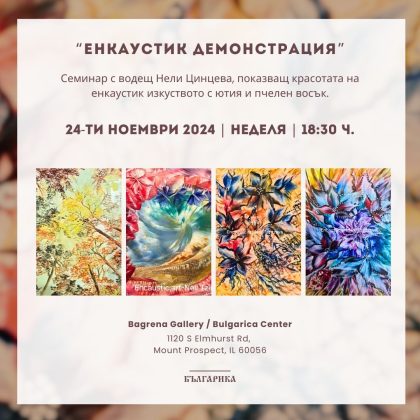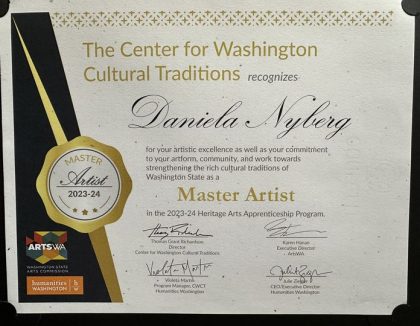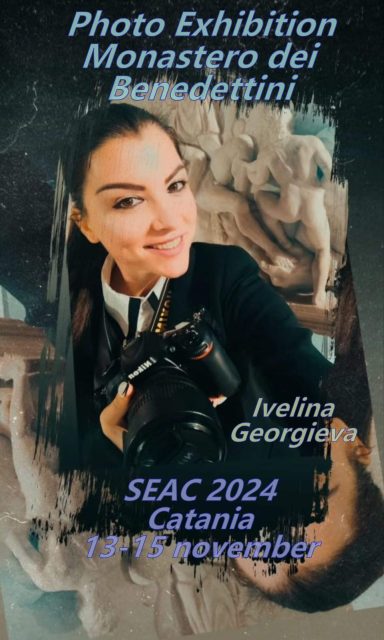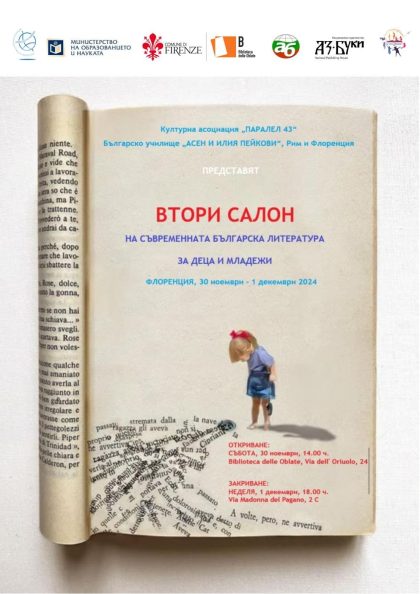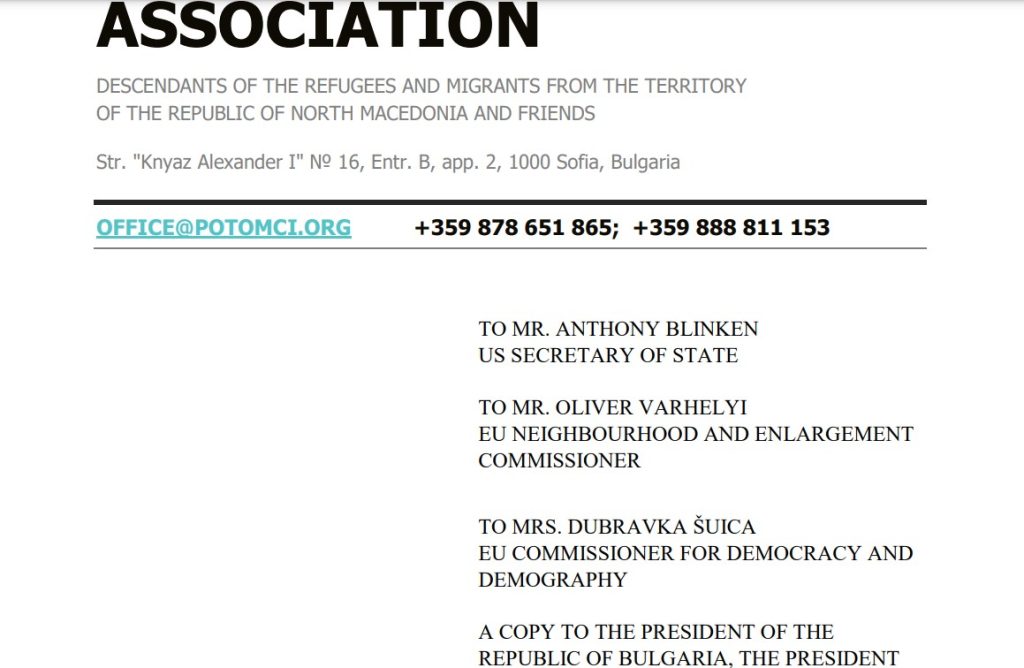
.
The Association of the Descendants of Refugees and Immigrants from the territory of the Republic of Macedonia sent a letter to the US Secretary of State Anthony Blinken, the EU Commissioner for Neighborhood and Enlargement Oliver Varhei and the EU Commissioner for Democracy and Demography Dubravka Shuica. The letter, which is about the prosecution in the Republic of Macedonia of Lyubcho Georgievski, chairman of the registration and subsequently banned Bulgarian Cultural Club „Ivan Mihailov“, is addressed with a copy to the President and Prime Minister of Bulgaria, the National Assembly and the mass media.
The following is the text of the letter (the original here – TO-The-State-Departamen-and-Eurocommissioners)
––––––––––––––––––––––––––––––-
ASSOCIATION OF THE DESCENDANTS OF REFUGEES AND MIGRANTS FROM THE TERRITORY OF THE REPUBLIC OF NORTH MACEDONIA AND FRIENDS
TO MR. ANTHONY BLINKEN
US SECRETARY OF STATE
TO MR. OLIVER VARHELYI
EU NEIGHBOURHOOD AND ENLARGEMENT COMMISSIONER
TO MRS. DUBRAVKA ŠUICA
EU COMMISSIONER FOR DEMOCRACY AND DEMOGRAPHY
A COPY TO THE PRESIDENT OF THE REPUBLIC OF BULGARIA, THE PRESIDENT OF THE NATIONAL ASSEMBLY, THE PRIME MINISTER AND THE MASS MEDIA
Subject: Prosecution in the Republic of North Macedonia of Ljubcho Georgievski, Chairman of the Bulgarian Cultural Club „Ivan Mihaylov“, registered and subsequently banned by the authorities.
DEAR MR. BLINKEN,
DEAR MR. VARHELYI,
DEAR MRS. ŠUICA
In the last year, Ljubcho Georgievski, chairman of the officially registered and then banned Bulgarian Cultural Club „Ivan Mihaylov“ in Bitola, was subjected to prosecution in the Republic of North Macedonia. For this purpose, a law was adopted in the country, which is the latest element in the local anti-Bulgarian legislation. It enters into force retroactively and stipulates that public organizations may only bear names approved by the government. Otherwise, the creation of new ones is not allowed, and existing ones have been banned.
On October 30, 2023, another court case against Ljubcho Georgievski began. He was accused of publicly publishing documents and quotes from Ivan Mihaylov (Mihailov) – the last head of the authentic IMRO (Internal Macedonian Revolutionary Organization, until 1913 IMORO – Internal Macedonian-Adrianople Revolutionary Organization). This, according to the authorities in Skopje, represented „the dissemination of racist and xenophobic materials electronically and the use of hate speech.“
We would draw your attention to the fact that from the end of 1944 until today, trials have been held in the territory of North Macedonia with varying intensity against persons who have preserved and demonstrated their Bulgarian self-awareness. The last two years have seen an escalation of this vicious practice, inherited from totalitarian/communist Yugoslavia. Registered Bulgarian organizations are being banned, their members are subject to stigmatization in the media, and citizens are incited to carry out aggressive actions against them. Such government-controlled vigilantism is a criminal act, but the perpetrators are not only not prosecuted, they are heroicised in public. Thus, the promotion of a certain type of hate crime directed against Bulgaria and Bulgarians continues to be part of state policy in North Macedonia.
Nowadays, even in Russia and Belarus, there is no prosecution of persons who publish documents with historical content. The observed practice in North Macedonia is a modern manifestation of the totalitarian „Law on Macedonian National Honour“, created in 1945, which instilled the official state doctrine in Skopje, created in Belgrade and Moscow and is external to the local population. Such behaviour is aimed at prohibiting the presentation of facts showing that in the geographical area of Macedonia during the Middle Ages, the Revival Period and more recent times there were Bulgarians. For example, according to the official statistics of the Ottoman Empire, which until 1912 ruled these territories, in some areas of today’s North Macedonia the Bulgarians were in the majority, while at the same time not a single „ethnic Macedonian“ was registered. However, the presence of the Bulgarians is being erased and this is inherently a genocide aimed at banning even the mention of a Bulgarian ethnic presence in the past and today.
The chairman of the banned Bulgarian cultural club, Ljubcho Georgievski from Bitola, has been threatened with imprisonment for up to 5 years for feeling spiritually connected to the ideas of Ivan Mihaylov, the ideologist of the political programme for the independence of Macedonia with equal rights for all ethnic groups in it, believing that the Bulgarian one is the most numerous. From 1934 to the end of his life in 1990, Ivan Mihaylov lived in exile and never once used the words „fascism“ or „National Socialism“ in his huge documentary heritage. However, because of his freedom-loving ideas, he was accused by the Communists in the Balkans of being a “fascist”, and this accusation was used as a pretext to persecute his ideas and followers. Such a practice of persecution is identical to Russian President Putin’s accusations against Ukraine of being “fascist”, and Russian aggression there is justified as a fight against “fascism”. Thus, Putin’s „denazification“ in Ukraine is identical to the „denazification“ that the government is now conducting in North Macedonia!
Among the rulers in Skopje, Ivan Mihaylov is the most denied leader of IMRO, because he was the only one of the leaders of the national liberation organization of the Macedonian Bulgarians, who had the historical chance to live and work in the period after the Second World War. Because of this, he left the richest theoretical legacy exposing the Communist policy of creating the new Macedonian nation on an anti-Bulgarian basis. All of his works have been published in Western Europe and the United States, and in addition to Bulgarian, some have been published in English. If necessary, we are ready to provide copies of them.
Ivan Mihaylov’s main transgression before the authorities in Skopje is that he was the successor of the work of Gotse (Georgi) Delchev, Dame (Damyan) Gruev and Todor Aleksandrov – leaders of the historical IM(O)RO. After 1944, Ivan Mihaylov was the main defender of the suffering Bulgarians in Macedonia. Despite state propaganda, for a part of the population in North Macedonia, Ivan Mihaylov continues to be an undisputed authority, which is why:
-
the numbering of the congresses of the IMRO-DPMNE party (the authentic IMRO has never been a party) is a continuation of the congresses of IMRO during the period when its leader was Ivan Mihaylov;
-
in 1995 and 2001, one of his most important books „Macedonia – Switzerland in the Balkans“ was published in Skopje.
-
Ministers from North Macedonia went on a pilgrimage to his grave in Rome;
-
His wax figure has a place of honour in the Museum of the Macedonian Struggle, established in 2011 in Skopje;
Such actions are at least a formal request for continuity and attempts have even been made to portray Ivan Mihaylov as an „ethnic Macedonian“. As early as the time of Yugoslavia, in 1957, his name was written as „Ivan Mihajlovski“, i.e. in the way Bulgarian surnames were forcibly changed in Yugoslav Macedonia after 1945.
In connection with the trial of the chairman of the Bulgarian Cultural Club, former Prime Minister of North Macedonia Ljubcho Georgievski (the coincidence with the names of the defendant in Bitola is accidental) stated that „the state, through its prosecutor, is involved irresponsibly, arrogantly and parodies the judiciary, only to prove an allegedly ideological affiliation of the man who is a symbol of the struggle for an independent Macedonia… Unfortunately, a process is currently underway in North Macedonia today, for which even Lazar Kolishevski himself (the former long-time Communist leader of Yugoslav Macedonia, and a confidant of Yugoslav dictator J. B. Tito) did not have the courage to pursue even in the darkest times and this is all a kind of veto that we impose on our own path to European integration.“
In order to demonstrate Ivan Mihaylov’s democratic views, we present a letter signed by him on 26 June 1976 to US President Gerald Ford and the US President’s response. A detailed report is attached to the letter, which reflects the findings of a number of prominent Americans and the media, according to which „the vast majority of the population of Macedonia is Bulgarian.“ Today, the work of these prominent Americans is also banned in North Macedonia and their writings have been falsified. We would like to emphasize that with this petition we are not denying the existence of a contemporary Macedonian identity among part of the population of the Republic of North Macedonia, but we insist that the human rights of those of its citizens who, despite constant repression, continue to preserve their Bulgarian identity, be protected.
Taking into account the facts presented here, we propose to study in detail the case of the violation of human rights of the chairman of the banned Bulgarian Cultural Club „Ivan Mihaylov“ in Bitola, Ljubcho Georgievski. In order to prevent such cases in the future, we insist on assisting North Macedonia to break its dependence on Belgrade and to irreversibly break with the vicious practices inherited from the Yugoslav totalitarian era. Until this is achieved, we insist that any financial assistance to the anti-reformist government in Skopje be stopped.
Yours sincerely,
CO-CHAIRMAN: Prof. Trendafil Mitev
CO-CHAIRMAN: Assoc. Prof. Spas Tashev
SECRETARY: Dimitar M. Dimitrov
Sofia, November 28, 2023
APPENDIX
Central Committee of the Macedonian Patriotic Organization of the United States and Canada
Indianapolis, Ind. June 26, 1976
The President of the USA
The White House Washington, D. C.
Dear Mr. President:
The Macedonian Patriotic Organization Union (MPO) address you on the occasion of the Bicentennial of American Independence.
In the conscience of mankind this glorious day is linked with the basic immortal ideas of the famous Declaration through which the USA officially and solemnly appeared at the international scene.
Our wish is that this Declaration eternally gives hope to the oppressed and respect to people all over the world. It is also our desire that the USA always be the mightiest country enjoying at the same time moral prestige.
The majority of our Union members are American born with the lesser part being naturalized citizens of the USA, but all of us devote our efforts, apply our labor for the good of our dear American Fatherland.
Parallel with our constant concern about the present and the future of the USA, we do not forget the fate of the Old Country. Thanks to democratic rule and broad civil rights ensured by the American Constitution, the MPO is fighting by all legal means to support and encourage the struggle of the Bulgarian nation in Macedonia. The Macedonian Bulgarians in the bigger part of Macedonia have been subjected to merciless assimilation and national-cultural genocide.
Had we not helped the heroic resistance of our enslaved brothers and sisters in the Old Country, we would have felt ashamed in making comparison with those generous sons of America, who interceded for us before the World. They revealed to the World our Bulgarian name, language and history, the past and the cultural traditions of the different ethnic groups constituting American Nation are accepted as a common treasure of this Great Country.
The most important task of our greeting is to express our deep gratitude to the USA. At the same time, we shall allow ourselves to remind you, in the special Appendix, of at least some of the many cases of American moral support, which has encouraged our people in the darkest period of Bulgarian history.
We are very sorry that no one from our Old Country has the opportunity to send his greetings to the American people due to the existing regimes there. We, the undersigned, feel flattered at the thought that we can express the admiration to America of our enslaved brothers and sisters.
Long live the progress and prosperity of the USA!
Long live the striving for freedom and justice of the Macedonian Bulgarians, as well as of all justice-loving people throughout the World.
Sincerely yours,
In the name of the MACEDONIAN LIBERATION MOVEMENT
Ivan Mihailov, Leader
Central Committee of the MACEDONIAN PATRIOTIC ORGANIZATION of the United States and Canada
Dr. Asparuh D. Isakov, President
Dr. Ivan Gadzev, Secretary
V. Rev. Fr. Borislav Kraeff, Vice-President
Bob Ivanoff, Vice-President
Alexander Tsakoff, Treasurer
Christ Alusheff, Member
Anton Popov, Member & Editor of the MACEDONIAN TRIBUNE
ALTERNATES
Jivko Nikoloff
Boris Gosheff
Tom Alusheff
AUDITING COMMITTEE
Dan Theodoroff
Rev. Fr. Stephan Mitov
Nick Nicoloff
APPENDIX
SOME FACTS AND PERSONALITIES BY WHOSE REMEMBRANCE WE EXPRESS OUR APPRECIATION OF THE USA
(With minor redundancies and corrected errors)
1. We are thankful to the USA because It gave a shelter and opportunity for work and development of the abilities and talents of our ancestors who were compelled to leave Macedonia because of the atrocities of the Serbian (Yugoslavian) and Greek authorities.
2. We are grateful to the USA because due to American Democracy we can voice freely our opinion on any burning issue. The Macedonian Bulgarians in the Old Country are deprived of basic civil rights.
3. Many Americans who exposed the truth about Macedonia used to encourage us to defend that, which our nation was deprived of by the occupiers.
4. Our hearts are gladdened because of the fact that almost simultaneously with the national-revolutionary upheaval of the American people during the second half of the 18-th century, the First Apostle of the Bulgarian National Revival – the monk PAISII (a Macedonian Bulgarian), enlightened and inspired the Bulgarians revealing in his famous „SLAVONIC-BULGARIAN HISTORY“ the glorious past of our nation. He ardently appealed to our people to struggle for religious and political independence. There is a curious similarity in the context of Fr. Paisii’s Appeal and the American Declaration of Independence.
5. Not only the Macedonian Bulgarians, but the whole Bulgarian nation is grateful to the American missionaries (Protestant pastors). These self-sacrificing American worked as enlighteners among our people beginning as early as the 20-es of the 19-th century. They greatly helped in the shaping of the modern Bulgarian literary language in an era when all Bulgarian districts – Macedonia, Thrace, Moesia, Moravsko, Shopsko, Timoshko, Branichevo, Roupsko, and Dobroudzha, suffered under the brutal and barbarian rule of the Turks, in an era witnessing the tremendous efforts of the Greek allergy to Hellenize the Bulgarians through the activity of the Orthodox Church.
The American missionary Dr. RIGGS was the first to choose the most suitable dialect for translating the Bible into Bulgarian language. Such translations appeared in 1827, 1840, 1858 and in 1871 and were spread in large circulation among the Bulgarians.
The magazine ZORNITSA, published by the missionaries for tens of years, played particularly beneficial role. Out of nearly 100 Bulgarian books printed in the course of the 19-th century, 70 were printed in the missionary printing shops in Izmir (Smyrna) and Istanbul (Constantinople).
The American missionaries sided with the Bulgarian population in Macedonia opposing the aspirations of the Greek clergy backed by the Athens government.
The magazine OUTLOOK in its issue of November 7, 1908 prints the letter of the American missionary Luis BOND. This letter is an answer to the offer of the American Ambassador to Turkey that all US missionaries to withdraw immediately from the Bitolya (Monastir) district of Macedonia, where the Bulgarians rose in arms against the Turkish Sultan’s despotic regime in 1903. An excerpt of the letter reads: „We would rather die in Macedonia, if it is the Will of God, than to continue living somewhere outside this land and despise ourselves.“
The American ROBERT COLLEGE in Constantinople was of great help to the whole Bulgarian nation, including the Macedonian Bulgarians. Many future prominent Bulgarians were educated there.
Dr. G. WASHBURN, a long-time Head Master of Robert College wrote the book „50 Years in Constantinople“ (Boston and New York, 1909). In his work, Dr. Washburn emphasizes (p. 132-184) the fact that the boundaries of the area populated mostly by Bulgarians encompass almost the whole of Macedonia and that the same boundaries were recognized unanimously by the ambassadors of all great European countries in the International Conference on the Bulgarian Question held in 1876 in Constantinople.
The missionary Dr. Edward B. HASKELL wrote in the magazine „Zornitsa“ of July 19, 1917 an article entitled „The Nationality of the Macedonian Population“. It is stated that the author has lived in different regions of Macedonia for 21 years. Dr. Haskell stresses explicitly that the overwhelming majority of the Macedonian population is comprised of Bulgarians.
6. We should mention also that about 900.000 Macedonian Bulgarians live today in Communist Bulgaria Itself. The major portion of them are emigrants from Serbia (Yugoslavia) and Greece and the lesser – constituting the population of the so called Pirin Macedonia, an integral part of Bulgaria since 1913…
Until 1912 Macedonia was under Turkish rule. The then Bulgarian population of this historical-geographic district numbered 1,200,000 according to objective European statistics. The Macedonian Bulgarians possessed their own schools, churches, monasteries and other social and cultural institutions and organizations set up by the means and the efforts of the local Bulgarians during the 19-th century. When the Serbian and Greek troops rushed into Macedonia in October, 1912, thousands of Bulgarian Orthodox churches, schools and libraries were closed or destroyed, or converted into Serbian or Greek ones correspondingly. The Catholic high school „Zeytinlik“ in Thessaloniki (Solun) was also closed because the bulk of its students were Macedonian Bulgarians…
7. We always pronounce the name of the outstanding American publicist Januarius Aloysius MACGAHAN (born in 1844 in Perry, Ohio), with a great respect.
Mr. MacGahan described the horrible massacres which followed the APRIL 1876 UPRISING of the Bulgarian people. This tragic but heroic episode from the history of our nation created favourable conditions for the liberation of part of the Bulgarian lands from the Turkish yoke in 1878. Unfortunately, due to the mutual enmity and rivalry between the Great Powers, Bulgaria was torn according to the cruel decisions of the July, 1878 Treaty of Berlin. The Treaty of Berlin eliminated the provisions of the well-known SAN STEFANO TREATY of March, 1878 envisaging the resurrection of the Bulgarian Kingdom, which was supposed to incorporate four fifths of Macedonia. And yet the Berlin Treaty prescribed certain reforms to be introduced, aiming to gain autonomy for Macedonia, however, they were never applied.
MacGahan travelled throughout Bulgaria accompanied by Mr. Schuyler – the American ambassador to Turkey. The name of MacGahan will be kept eternally on the pages of Bulgarian history.
8. Being unable to enumerate here all American scholars, writers, statesmen, newspapers etc., who sympathized with the plague of the Macedonian Bulgarians, we shall express our admiration and thankfulness to all of them mentioning only several names.
a) H. A. GIBBONS writes:
„In considering the Macedonian problem, it must never be forgotten that the great bulk of the population of Macedonia is Bulgarian, in spite of all the learned dissertations and imposing statistics of Greek and Serbian, writers. “
(Gibbons, H. A., „The New Map of Europe“, New York, 1914, p. 178)
b) W. M. SLOANE says:
„Beyond a question, the Slavs of Macedonia are Bulgarians.“
(Sloane, W. M., „The Balkans: A Laboratory of History“. New York, 1914. p. 210)
c) W. S. MONROE:
„The Bulgarians far outnumber all the other races in Macedonia.“
(Monroe. W. S., „Bulgaria and Her People: With an Account of the Balkan War, Macedonia and the Macedonian Bulgar(ian)s. Boston, 1914, p. 369)
d) Prom one letter to Sir Edward GRAY, as well as to the prime ministers of the other Great Powers:
„After years of acquaintance with Macedonia, either through residence or travel, or both, mingling with the people and living in their home, we are fully convinced that the great bulk of population in the region which we have indicated as the Macedonian field of our work, is Bulgarian in origin, language, and customs, and forms an integral part of the Bulgarian nation.“
(Samokov, Bulgaria, Aug. 5, 1913. Signed: J. F. Clarke, D. D., Missionary in European Turkey for 54 years; J. W. Baird, D. D., Missionary in European Turkey for 40 years; Robert Thomson of Edinburgh, Missionary for 30 years oi Constantinople and European Turkey).
e) From the telegram to President Wilson:
„It is the testimony of our Mission which has worked without political aims among Balkan peoples for 60 years, that in the territory of our Macedonian field extending from Skopje and Ohrid to Drama, the great bulk of the population is Bulgarian in origin, language and customs, and forms an integral part of the Bulgarian nation.“
(Samokov, Bulgaria; December 11, 1918. Missionary of the American Board. Signed: Lercy F. Ostrander, Lyle D. Woodruff, H. B. Rang).
f) Mr. Albert SONNICHSEN, an American writer and newspaperman, who was a guerrilla, member of a Macedono-Bulgarian revolutionary regiment fighting the Turks. He travelled in Central, Southern and Western Macedonia in 1907 together with his Bulgarian friends from the IMRO (Internal Macedonian Revolutionary Organization). Later, in 1909, he published in New York his book „Confession of a Macedonian Bandit“. He underlines on many pages in this book as well as in the Social Studies Encyclopedia (1930 original edition; edited by Edwin R. A. Seligman and Alvin Johnson), that the Macedonian Slavs are Bulgarians.
g) In September, 1901, the Boston Missionary Miss Ellen M. STONE was kidnapped by Macedonian revolutionaries and spent several months among the revolutionary-minded Bulgarian people in Macedonia.
After her release, she depicted her dramatic experience in the American magazine „McClure“. When speaking about her impressions of Macedonia, she praised the generosity, the tender and friendly attitude of her captors and of the common Macedonian Bulgarians. She did not mention any other nationality but Bulgarians in her lectures about Macedonia before the American public.
After World War II, in the Serbian-dominated communist Yugoslavia, a film was made devoted to Miss Stone’s, abduction. But the Serbian communist propaganda does not mention at all the numerous interviews and talks of Miss Stone which indicate the presence of Bulgarian population in Macedonia. Belgrade propaganda calls both the revolutionaries and the people who kidnapped Miss Stone and with whom she lived for a long time – „Macedonians“. „Macedonians“ are not only the Bulgarians, but also the Albanians, Aroumanians (Vlachs), Greeks and Turks living in the historical-geographic district of Macedonia. The Serbo-communists strive to „prove“ that there is an independent South-Slavonic „Macedonian“ nation. This is absolutely ridiculous! Until 1945 none spoke about any other Slavs in Macedonia but Bulgarians. The government of Yugoslavia headed by Tito decided after World War II to impose the geographic denomination of the district – Macedonia, as a basis for the national name of the Bulgarian people, who inhabited this ancient land for 15 centuries. According to the „logic“ of the Yugoslav communists, we should consider for example that a man from the town of Turs in the French historic province of Touraine, or another from Montpellier in Languedoc, are not French but correspondingly of Tourainian or Languadocian nationality! The Bulgarians living today in communist Yugoslavia are subjected to brutal assimilation. They have two choices – to become either „Macedonians“ or „Serbians“.
h) The New York stationed „Geographical Society“ published in 1917 the book of Mr. Leon Dominian „Frontiers of Language and Nationality of Europe“. According to the author’s data, 81.5% of the Christian population in Macedonia are Bulgarians totaling 1,172,186.
i) S. P. FOGDALL, Ph. D., wrote an interesting article on the Macedonian Question in the Geneva published newspaper LA MACEDOINE of April 24, 1931.
j) Prof. Rudolf BRODA delivered a lecture in Geneva on Novemer 3,1931, and defended the idea of an independent Macedonia.
k) Prof. Ferdinand SHERRIL from the University of Chicago published an article in „La Macedoine“ (Geneva) on November 27, 1931 also recommending the idea of an independent Macedonia.
l) Prof. Dr. Fritz KRUGER, a specialist in International Law and American Diplomacy from Columbia University, spoke and wrote many times in defense of the Macedonian Bulgarians suffering under Yugoslavian (Serbian)… occupation. He was a frequent contributor to „La Macedoine“ (Geneva) during 1931. He also promoted the idea of the creation of an independent Macedonian State.
m) Prof. John BAKELLES is a former editor of „The Forum“ and „Living Age“ and author of books on political and economic problems. In many of his articles and lectures presented in the USA between the two World Wars, he has defended the cause of the Macedonian Bulgarians enslaved by Yugoslavia…
On August 18, 1932 he gave a talk on the Macedonian Question in Williamstown, Massachusetts, before the local Political Science Institute. At this meeting Prof. Bakelles was joined by J. Fisher – doctor in political science from Columbia University, a former professor at Robert College in Constantinople, and by Dr. Arnold Wallfers.
On November 2, 1934, Mr. Bakelles spoke about IMRO at a meeting of the American Academy in Political and Social Studies. The professors Bernard Smith and Luigi Villari also delivered speeches devoted to the martyrdom of the Macedonian Bulgarians. This meeting was attended by many eminent Americans and was presided by the American Secretary of Treasury Mr. Morgentau, a former American ambassador to Turkey during the administration of President Wilson. The speeches of the three speakers were printed in the January issue of the Academy in question.
Mr. Bakelles also spoke in Troy, New York and in Providence, Rhode Island, in 1930.
The newspaper MACEDONIAN TRIBUNE – Indianapolis, Indiana, in its issue of July 14, 1932 wrote about the meeting between John Bakelles and the IMRO leader Ivan Mihailov.
n) Dr. A. H. LYBYER is a scholar well acquainted with the Balkan problems, former professor at Robert College in Constantinople. He delivered a speech at the Convention of the Macedonian Patriotic Organizations (MPO) held in Cleveland, Ohio, on September 3, 1944. He pointed out that the Macedonian Slavs are as much Bulgarians as are all others living in the Bulgarian state.
o) Prof. Frederick Stanley RODKEY, Associate Professor of History at Miami University, published an article on the Macedonian Question in „La Macedoine“, April 17, 1931, Geneve.
p) Dr. H. J. O’NEILL, Head Department of Economics, St. Louis University, delivered a speech at the MPO Convention in St. Louis, Sept. 7,1942.
q) Dr. J. S. Roucek, author of many books Including works on national minorities problems. He was a professor at Hofstra College in Hempstead, N.Y. He delivered a speech on the Macedonian Question at the MPO Convention in Pittsburgh, Pennsylvania, held in September, 1940.
r) Dr. R. A. LUHMAN, founder of the First Reform Church in Youngster Ohio, addressed the 17-th annual MPO Convention on September 4. 1938, at Buffalo, New York.
s) Prof. Heinrich A. STAMMLER, specialist in Slavic languages in the University of Kansas, spoke at the 50-th annual MPO Convention in Cleveland, Ohio, in September, 1971. He pointed out clearly that the Macedonian Slavs are Bulgarians.
9. There are cases when American organizations appealed for public support for the Macedonian Bulgarians. Here we give some examples:
a) In September, 1903 special committees were set up in New York and Philadelphia which appealed to the American people to help suffering Macedonia. In August, the same year an anti-Turkish uprising broke out in Western Macedonia.
b) Different resolutions and letters have been sent to CONGRESS in Washington. Their authors and/or signers were outstanding Americans as Bishop Bruster of Hartford, Connecticut; Senator Horr of Massachusetts; Prof. Fisher of Yale University; Bishop Potter etc. They have appealed for prompt support for the Macedonian Bulgarians.
c) In October, 1903 the Pan-American Bishops’ Conference held in Washington, D. C., endorsed a special resolution, aimed at helping the Christian population in Macedonia.
d) In February, 1904 a group of senior Connecticut citizens, headed by the Governor endorsed a resolution on Macedonia, insisting that all clauses of the Berlin Treaty of 1878 be put into practice immediately. This resolution was dispatched to Congress in Washington.
e) We must underline the generous initiative and good will in which the work of the famous Carnegie Commission of Inquiry on the Balkan wars, was based. The report of the Commission was printed in Washington, D.C., in 1914. The American Dr. Samuel T. Dutton, Professor at Columbia University, was a member of the Carnegie Commission, besides the other participants – prominent scholars and politicians from 6 countries. Many pages of the final report are focused exclusively on the Macedonian Bulgarians and their martyrdom.
f) Dr. Arthur I. ANDREWS, Professor in Oriental and Slavonic history in the State University of Vermont. He was a lecturer in diplomacy in many European universities. He delivered a lecture entitled “The Possibilities for a Balkan Pact”. In his opinion there will not be any pacification in the Balkans without a justful solution of the Macedonian Question.
g) The Chairman of the American Union for Civil Rights and President of the Political Prisoners’ International Committee Dr. Roger N. BALDWIN voiced his protest on several occasions condemning the oppressive policy of the Yugoslav and Greek authorities against the Macedonian Bulgarians. He shared the idea of an independent Macedonia, an eventual member of a Balkan Federation. He spoke about the Macedonian Question at a meeting in Washington, D. C. This event was reflected in the Geneva newspaper „La Macedoine“ of March 6, 1931. Before this, the same newspaper has quoted him repeatedly.
On January 19, 1928, Dr. Baldwin wrote an official letter to Sir Eric Drumond, Secretary in Chief of the League of Nations. He emphasized openly that Bulgarian churches and schools are prohibited in Yugoslavia and Greece.
The letter reads that only the League of Nations is capable of putting an end to the terror in Macedonia. In this letter it is also added that some of the members of the Political Prisoners’ International Committee have visited Yugoslavia and Bulgaria and sided with the protests of the Macedonian Immigrants’ National Committee in Bulgaria against the violence of the occupational authorities of Yugoslavia…
Many distinguished American judges, professors, writers and statesmen were members of the International Committee for Political Prisoners; among them: John Holms, James Adames, John Lovejoy, Elliott, Alice Hamilton, David Star Jordan, Clarence De Rois.
h) Mable Saterly INGLASS published in the magazine „Foreign Policy Reports“ of December 6,1933, an article named „The Balkans and the World Crisis“. The author concentrates on the idea of an independent Macedonia, on the Macedonian Bulgarians deprived of their civil rights etc. The magazine is an organ of the „Foreign Policy Association“.
10. The American press has printed many times announcements and articles concerning the suffering of Macedonia under the despotic and brutal rule of inhuman regimes. The oppressors have been condemned and the heroic resistance of the Macedonian Bulgarians depicted. Our nation had as a slogan the often quoted phrase of Thomas Jefferson: „Resistance to tyranny is submission to God.“
It is a pity but it is impossible to list here the hundreds of cases when the name of Macedonia has appeared in the pages of the American press since 1893. We shall mention only few of the American periodicals which have defended the violated rights of our nation.
a) The magazine „The Independent“ of August 20, 1903 wrote about the rebellion of the Bulgarians in Macedonia and notes its surprise at the fact that the insurgents were being betrayed to the Turkish authorities by the Greeks.
b) The magazine „Outlook“ of September 19, 1903 pleads for real reforms to be introduced in Macedonia and for the appointment of a Christian Governor.
c) The magazine „Harper Weekly“, October 3, 1903 wrote in defense of the rebels and indicated that they were Bulgarians.
d) The same magazine writes again on October 31, 1903, about the Bulgarian uprising in Macedonia and pleads for the granting of autonomy to MACEDONIA. Many U. S. press announcements are devoted to this rebellion, known as „ILINDEN“ („St. Elijah’s Day“) UPRISING. There are plenty of details on the uprising in question kept in US libraries and archives.
e) Many of announcements about the Macedonian Liberation Movement have been published in the USA, still at a time when Macedonia was a part of the Turkish Empire. In this dark era, i. e. from 1893 to 1913, Macedonian revolutionaries used to have their weaponry in the American High School in Samokov (a town in the Bulgarian mainland, near the then frontier with Turkey).
f) Reuben H. MARKHAM, a correspondent of many years for „Christian Science Monitor“ was an excellent specialist on Balkan affairs and problems. He was particularly well acquainted with Macedonia. He wrote much materials in favor of the Macedonian Bulgarians enslaved by Yugoslavia (Serbia)… Sometimes he used to publish his works, in Bulgarian newspapers. He wrote mostly between the two World Wars, but continued to write sporadically on the Macedonian Question after World War II always emphatically defending the cause of the Macedonian Bulgarians.
We present some issues of „Christian Science Monitor“ with articles on the Macedonian Liberation Movement:
In November issue of 1924 there appeared an American scholar’s article; article of February 4, 1927; June 20, 1929; Juno 20, 1029; October 7, 1929; January 31, 1930; Juno 17, 1930; during March, 1931; during April, 1931. This issue contains an Itinerary by Mr. Markham describing his journey in Southern Macedonia under Greek occupation and pointing out anew the Bulgarian ethnographical features and language of the Macedonian Slavs; article of October, 1931.
g) We also point out certain articles from „New York Times“; April 20, 1927 article by Prof, G. P. Gooch of Cambridge University; article of May 1, 1927; June 26, 1927 article by the political writer Ann McCormick; of March 16. 1928; June 24, 1928; July 16, 1928 article by Dr. Henry Suzallo; April 9, 1929; July 11, 1929; November 11, 1929; of March 8, 1930; March 11, 1930; June 13, 1930; March 7, 1931; of April 12, 1931; of December 17, 1933 – about the rights of the Bulgarian minorities; of January 21, 1934; of May 5,1935.
h) „New York Herald Tribune“ article of August 19,1928 – by Ann O’ Hair McCormick; an article of May 5, 1935.
i) „Chicago Daily News“ article of January 9, 1924; of December 5, 1927; of March 20, 1928; of April 22, 1928.
k) „Chicago Tribune“ of March 10 and June, 1930.
l) „Detroit Free Press“ of October 23, 1927 of November 1, 1927; of November 11, 1927; of January 15, 1928.
m) „Daily News Sun“ of October 13, 1927.
n) „Springfield Sun“ of September 17, 1932.
o) „The Nation“ of May 23, 1925 – article by Mr. Paul Rowland; article of October, 1928 by the same author. Mr. Rowland writes here that all foreigners who have lived in Macedonia before 1912, including the American and French consuls and missionaries unanimously acknowledge that Macedonia is a Bulgarian land.
p) „Indianapolis Star“ of April 12, 1928 and July 9, 1928.
q) „Cincinnati Inquirer“ of January 13, 1929.
r) „Associated Press“ of September 18, 1928; of June 25, 1929; February 4, 1930; of December 25, 1932.
s) „Daily News Sun“ of October 13, 1929.
t) „Omaha Tribune“ of April 25, 1930.
u) The magazine „The New Republic“ of December 31, 1930 underlines that the Slavs living in Macedonia are of Bulgarian origin and are subjected to merciless assimilation by force.
v) „United Press“ of March 17, 1931.
w) The magazine „The Town Crier“, New York, November, 1932. It was published by the American Political Education League, by Town Hall and the Economical Club.
x) „New York Sun“ of April 19, 1935.
y) In the memoirs of the famous Macedonian leader and revolutionary Ivan Mihailov, a Bulgarian by nationality, there are plenty of foreign press quotations between the two World Wars about the Macedonian Liberation Movement. The 45 American official witnesses revealed clearly that this is a struggle of the Bulgarian population against the brutal Serbian and Greek invaders; Another 53 American documents emphasize that there is hardly any other nation in Europe which is suppressed so much, and denied the rights of national minorities as the Bulgarian in Eastern and Southern Yugoslavia and Northern Greece. According to these American documents, the unfortunate Bulgarian population in Macedonia are subjected to an integral cultural-national genocide, to a gradual denationalization.
11. We shall mention some facts linked with the sympathetic attitude of American foreign policy in regard to Macedonia:
a) The President Theodore Roosevelt and Secretary of State John Hay expressed their sympathy with the Macedonian Bulgarians. The US Governments assured Great Britain of its readiness to give all necessary support it needed to impose the fulfilment of article No 23 of the Berlin Treaty, an article prescribing autonomy for Macedonia.
b) When concluding the Peace Treaties after World War I, President Woodrow Wilson appointed a 3-member commission to prepare a report on Balkan Peninsula problems and to submit another report on conditions for settling down of the Balkan controversies. The commission was comprised of: S. E. Mazes, David Hunter Miller and Walter Lippman. The commission`s presentation was headed: „Outline of Tentative Report“.
c) The former Bulgarian Prime-Minister during World War I, Vassil Radoslavov wrote that the Bulgarian neighbors and war victors Serbia, Greece and Rumania have stubbornly insisted at the Peace Conference in Neuilly, near Paris, that Bulgaria be divided between them. But the USA was the country that put a stumbling block before their nasty aspirations and greediness.
d) After World War I the USA reached a common agreement with England, Japan and Italy, that autonomy be given to Macedonia – concerning the counties which were to be incorporated in the newly created Serb–Croato–Slovenian Kingdom (Yugoslavia). However other countries succeeded by cunning and insidious- diplomatic maneuvers in preventing the implementation of this project. Thus they continued with new impetus their denationalization campaign in Macedonia.
There is an interesting book by David Hunter Miller treating this project for autonomy – „My Diary at the Conference of Paris“ (N. Y.,1925).
e) The USA has insisted vigorously that Serbia and Greece to sign a treaty for the protection of national minorities.
Mr. Robert J. Caldwell, an American delegate to the Peace Conference of Paris pleaded for ensuring civil rights for the Macedonian Bulgarians.
– – –
We are firmly confident that the Bulgarian population in Macedonia will be saved after all from the clutches of their torturers, that the Macedonian Question will be solved in the most just manner; that Macedonia will gain her independence which was the 1893 ideal of our ancestors – the founders of IMRO – the Internal Macedonian Revolutionary Organization.
THE RESPONSE OF THE AMERICAN PRESIDENT GERALD FORD
Published in. „Macedonian Tribune“, Indianapolis, 1.07.1976.
A BICENTENNIAL MESSAGE
By the President of the United States of America
We now mark the beginning of our Third Century as an independent nation as well as the 200-th Anniversary of the American Revolution. For two centuries our Nation has grown, changed and flourished. A diverse people, drawn from all corners of the earth, have joined together to fulfill the Promise of Democracy.
America’s Bicentennial is rich in History and in the promise and potential of the years that lie ahead. It is about the events of our past, our achievements, our traditions, our diversity, our freedoms, our form of government and our continuing commitment to a better life for all Americans. The Bicentennial offers each of us the opportunity to join with our fellow citizens in honoring the past and preparing for the future in communities across the Nation. Thus, in joining together as races, nationalities, and individuals, we also retain and strengthen our traditions, background and personal freedom.
Gerald R Ford
.
